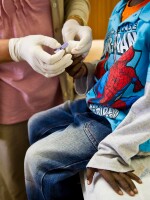Harvard researchers say they've uncovered a big problem among the nation's 700,000 police officers: a serious lack of sleep.
In what's believed to be the first study of its kind, the researchers queried nearly 5,000 municipal and state police officers in the U.S. and Canada about their sleep habits and symptoms of possible sleep disorders. Then they assessed their on-duty performance for two years.
Forty percent had sleep disorders, and the vast majority of these were undiagnosed before.
The implications are big – both for the officers themselves and the public they serve.
Consider these findings:
Sleep-starved officers also reported falling asleep at meetings more often and calling in sick.
The surprisingly high incidence of sleep apnea has grave implications for officers and their departments. The disorder taxes the heart, probably because the sudden jolts of waking up are accompanied by a surge of adrenalin.
"That may be what lays the groundwork for an increase in cardiovascular disease," says Dr. Charles A. Czeisler of Brigham and Women's Hospital in Boston. Officers with sleep apnea "had 90 percent greater odds of cardiovascular disease, even when we adjusted for their age, sex, body mass index, smoking and other risk factors.
Officers with sleep apnea also had much higher risk of diabetes (61 percent), depression (150 percent), emotional burnout (270 percent) and risk of falling asleep while driving home from work (126 percent).
The driving implications are especially sobering, given the amount of time many officer spend behind the wheel – and the importance of police cars as an everyday work tool.
One in four of the total study group reported falling asleep at the wheel once or twice a month. They also reported a higher rate of falling asleep while stopped in traffic, talking on the phone or in meetings.
Czeisler thinks frequent problems with what he calls "drowsy driving" help explain why car accidents have overtaken criminal assaults as the top cause of death among police officers.
"Motor vehicle crashes have overtaken felonious assaults as the most common cause of police mortality," Czeisler told Shots. "And drowsy driving is one of the leading causes of motor vehicle crashes and fatalities."
Asked what can be done about the problem – given the intrinsic nature of police work, with frequent changes in shifts – Czeisler says the study, which appears in the Journal of the American Medical Association, contains an important clue.
Massachusetts state troopers had far less sleep apnea than other officers in the study. That fits, Czeisler says, because they were much less likely to be obese – and obesity is a prominent risk factor for sleep apnea.
The likely reason the Massachusetts troopers were more fit, Czeisler says, is that the state requires them to pass an annual fitness test and provides gym equipment and paid time to work out.
"I'm sure this fitness test has paid for itself many times over in reducing sleep apnea," Czeisler says, "because of the markedly increased health care costs and accident rates among those who have sleep apnea. If that turns out to be the reason, then Massachusetts could be a model for the nation."
Massachusetts officials tell the Harvard researchers that they will start screening troopers for sleep problems, using the questionnaires the researchers employed.
Copyright 2020 NPR. To see more, visit https://www.npr.org.



